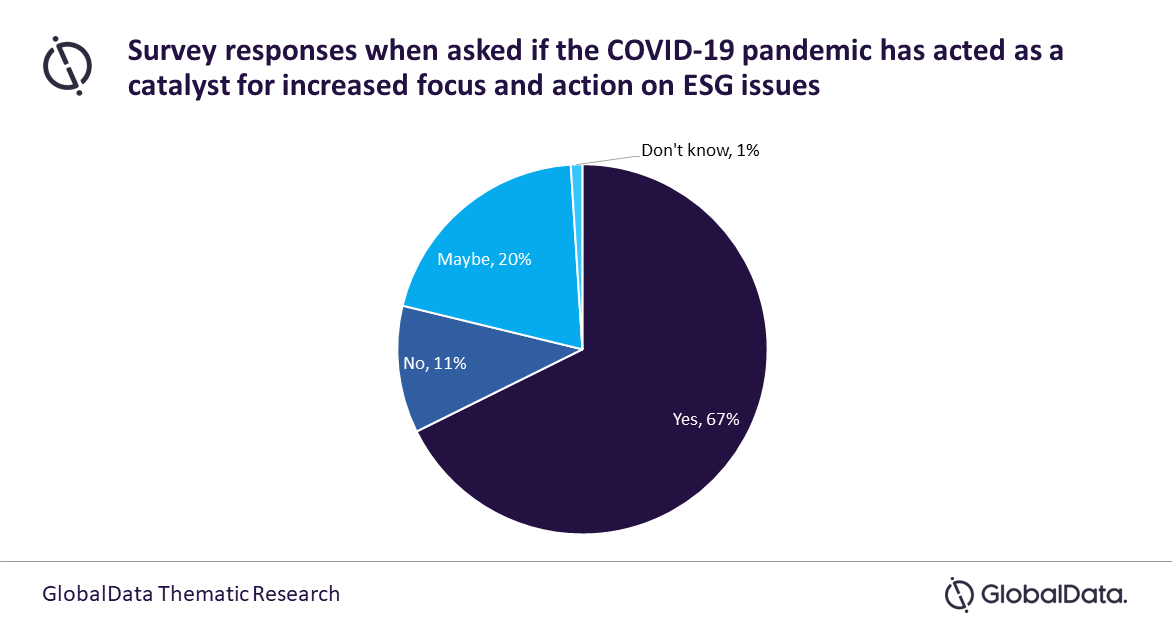Lagos — A survey by GlobalData has revealed that 67% of 1,500 ESG* and CSR* executives across all industries believe that the COVID-19 pandemic has increased focus and action on ESG issues. The leading data and analytics company notes that COVID-19’s shake up of the status quo has led businesses to see just how accomplishable environmental progress can be—with some of the higher polluting industries starting to take note. 
Filipe Oliveira, Thematic Analyst at GlobalData, comments: “The sudden disruption of numerous business activities due to COVID-19 led many to realize that environmental action was much more feasible than previously thought. Most of the focus and investment within ESG is going towards environmental issues—69% prioritized ‘environment’ issues, while 16% prioritized ‘social’ and 15% ‘governance’—however, the pandemic also caused companies to face new social and governance challenges as companies had to step up their risk management practices while dealing with a new major health and safety issue.”
The survey, which was published as part of GlobalData’s latest report, ‘ESG Strategy Survey 2021 – Thematic Research’, also revealed a broad consensus around the importance of ESG in decision making, with 65% of respondents noting it is ‘very important’ and 32% said that it is ‘important’. Big polluters seem more attuned to the importance of ESG, with more representatives from packaging, mining, oil & gas, automotive, and power companies saying ESG was ‘very important’ when compared to other sectors.
GlobalData asked analysts in the Automotive, Power and Oil & Gas industries on their thoughts on these findings:
David Leggett, Automotive Analyst at GlobalData, comments: “As we recover from the pandemic, automotive company leaders are increasingly highly attuned to ESG issues. Examples of this include the drive for more electric vehicles (EVs) and sustainability in manufacturing activities. There’s a strong business rationale to invest selectively in high-growth product areas such as EVs and to save costs wherever possible—for example in energy use. COVID-19 has necessitated a reboot for automotive corporate strategies in a changed world.”
Rohit Ravetkar, Power Analyst at GlobalData, comments: “The pandemic is driving the urgent evaluation of issues in the power sector that were previously underplayed, including ESG policies. As consumers are looking towards brands for environmental leadership, many companies have pledged to drive sustainability changes, most notably in the power sector, by announcing a transition to cleaner resources and energy efficiency. These companies include EDF, Enel, and Engie. In the meanwhile, great strides have been made towards ESG goals—for example, there were significant renewable capacity additions globally during the pandemic, particularly for technologies such as solar PV and wind power.”
Bargavi Gandham, Oil & Gas Analyst at GlobalData, comments: “Since the COVID-19 outbreak, leading oil and gas companies have been re-evaluating their operations, with emphasis on clean energy. This has brought about a change in their approach towards ESG, especially on the environmental aspect. Activities from leaders such as Shell, BP, and Equinor has also trickled down to smaller players, national oil companies, and service companies. Around 1,800 industry players have pledged to achieve net-zero in carbon emissions by 2050. Companies are also publishing Sustainability reports annually to improve the transparency of their operations. Overall, the pandemic has enabled the industry and its people to understand and appreciate the importance of ESG.”
Filipe Oliveira, Thematic Analyst at GlobalData, notes: “Huge focus has been placed on environmental issues. Worryingly, a significant majority of survey respondents said that governance issues were both less important and the focus of less investment: only 20% said that governance was the most important ESG factor. Inadequate governance practices will make it more likely that companies will fail to meet ESG goals, including those that would improve their social and environmental records. All three are needed to ensure progress.”
Information based on GlobalData’s report: ESG Strategy Survey 2021
GlobalData’s annual ESG Strategy Survey report is based on a survey of 1,500 ESG leaders and executives worldwide. The survey was designed to help understand the extent to which companies are planning and implementing ESG practices. ESG and CSR executives and leaders were asked about their company’s plans and procedures and their views on various related issues, including the importance of specific ESG factors and the impact of ESG plans on revenue. Our sample is weighted by national GDP to ensure that respondents’ views are fairly represented across all major countries. The interviews were also spread across a range of 21 industries. All quantitative interviews were conducted on a confidential basis. Fieldwork for the ESG Survey 2021 was conducted online in October 2021.
* Environmental, social, governance (ESG); Corporate social responsibility (CSR)
** GlobalData surveyed 1,500 ESG and CSR executives from around the world in October 2021, to gauge how companies are setting up and implementing plans to improve their records on environmental, social, and governance factors.



